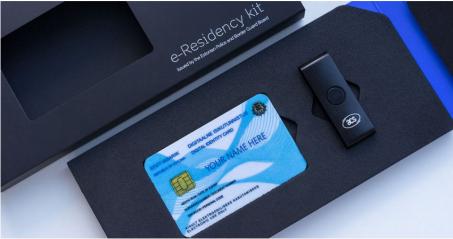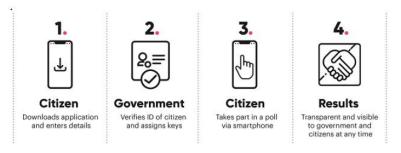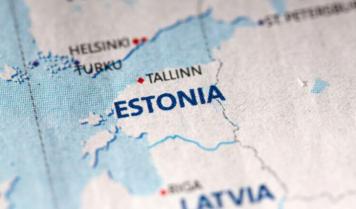Observation | The rise of small countries! Looking at blockchain governance from Estonia
Estonia is often described as a purely digital society. Today, most of the government's services are online 24 hours a day, and the privacy of the public database is fully protected by blockchain technology. Estonian people have online medical care, online taxation, and can apply for a license and change their driver's license data without even going to the supervision station. For them, there are only a few things left that they need to go in person, like getting married or buying real estate.

When registering an Estonian e-residence, you will receive a government-issued smart ID card that provides digital identification and authorization. This way, even if you don't live in Estonia, you can digitally sign important documents, access security services and conduct secure transactions. Https://www.leapin.eu/articles/e-residency
Have you ever thought about why we have to waste a lot of time waiting in line for a small piece of paper, and that piece of paper can only show that your identity is really you? Governments need to provide convenient public services like Taobao. Selling their products is the same: no need to appear, no service costs, no business hours.
- Viewing the Supervision of Global Encryption Industry from the Regulations of Hong Kong Virtual Assets Trading Platform
- The Supreme People's Court requested to strengthen the application of blockchain to promote the wisdom court; the Hong Kong Securities Regulatory Commission issued a new virtual asset policy
- 11000+ participants, 130+ speakers, 13.5 million+ full network exposure, World Blockchain Conference·Wuzhen created these “data miracles”
I don't know why, people always look forward to getting better services or products from private companies, but forget that there is a lot of room for improvement in government services. After all, we have paid huge taxes every year. But Estonian residents will not have this problem. Estonians believe that if private companies have begun to apply blockchain technology to improve processes or protect privacy, the government absolutely needs to catch up.
From the government to establish the most important process: Estonian people decided to implement in the most effective way, all overseas tourists, expatriates or those who could not go to vote for any reason can use blockchain technology through virtual identity. The completion of the vote, the use of blockchain voting also allows Estonian residents to rest assured that their election results, the efficiency is much higher than the traditional voting.
Blockchain voting: the establishment of the entire ecosystem
Some people think that the application of blockchain technology to the government can be done overnight, but just blockchain voting requires the establishment of a digital identity, a public-chain platform, and repeated testing of security. These network applications are all built on a strong information infrastructure. Above the relevant policies, and after long-term cumulative results. Estonia's entire country is built on the "X-Road" virtual system, and it also has a complete network national policy, including complete supporting measures, network policies, and security protection. It also needs to meet the EU's requirements for "data privacy". .
In fact, Estonian nationals do not have a single set of figures; if they want to engage in public affairs, they can also log in via Mobile ID, and behind these applications are complete plans. From the birth of a baby, the records, voting, study, medical treatment, and cross-border applications of the household registration are all connected and shared through the data of the inter-ministerial meeting.

Figure: Block Network
Estonians have an advanced system of citizenship, and individuals who are willing to participate in the political society gradually find new ways of spontaneous organization and coordination of opinions, gradually forming a transnational “cloud community”; and with this type of participation, people have the opportunity Gaining a new "self-sovereign identity" that is independent of any existing nation state. Estonia uses a platform-based identity system, independent of the physical society, and constructs a new ecology in the cloud and chain. It sounds like a utopia. The establishment of society—– emphasizes individual freedom and sovereignty, but in extreme cases, is it possible that another dystopian society has emerged because of market niches and human weaknesses?
Is it feasible to use blockchain technology to vote?
Estonian hacking problem is serious
In addition to Estonia, the Catalonia Autonomous Region has been striving to be independent from Spain since 1922. In 2017, they finally completed independence through a referendum. In October this year, the Catalan government passed a bill hoping to establish an electronic voting. Systematics, open nationals living abroad participate in national elections, and the authorities hope to introduce the system by 2020 and open up all voters. But can the drawbacks of traditional online voting security and privacy be solved with blockchain?

At the end of April 2017, Estonia also faced a large-scale cyber attack. The websites of Congress, government departments, banks, and media were almost paralyzed, and the scope was very wide. In order to ensure the function and security of public services, Estonia opened the world's first "data embassy" in Luxembourg in 2018. It is known as the embassy, an overseas data center, and the digital government's security protection also comes from physical documents and equipment. Switch to data, data. The embassy is mainly used to back up national digital data such as national identity cards, taxes, annuities, real estate, and business registration. Zi'an is the national security. Even if the government is attacked by cyber attacks, it can also access data at any time to have double guarantees. It is also an important part of the overall strategy of national data management.
In addition to hacking, personal voting privacy and accuracy are also very important. The imaginary "blockchain voting" should look like this:
1. The government sends a set of IDs to the public, and this set of IDs also has a set of public keys and corresponding private keys; the public key is responsible for recording job information between the public and the government, and the private key is public information.
2. Everyone voted for a key vote after verifying the identity of the public and private keys.
3. The government will receive a record of the public key of the public. There will be encrypted information on the people who voted for it. Only the results can not know the personal information.
4. According to the blockchain transmission speed, the billing can be completed in a very short time.
However, I would like to emphasize that there are many preconditions for the above imagination; if the following requirements are not met, the blockchain that was originally decentralized will become a super-center management tool:
1. The relationship between the public key and the private key cannot be recorded. Once the relationship between the two is known, the privacy of the vote is destroyed, and the meaning of the blockchain is lost.
2. Each group of government public keys held by each person can only be used for public affairs. Public keys cannot be used for personal identity authentication or transaction credentials. When a group of public keys is used for too many private transactions, Perhaps it will let others grasp some of the information, and then chaos the entire ecosystem to cause information leakage.
So blockchain voting is not infeasible, just need to ask some questions
1. If blockchain voting is implemented, is the current blockchain node able to establish consensus and recognize the speed of writing information through operations, can it be faster than other billing methods? Assuming its speed is real-time, will real-time public information affect the voting results?
2. The cost of construction is still too high
3. If the government wants to write the personal data in the control, and the government knows that the private key B corresponding to the public key A is the person C, then the voting result is equal to the registered name; and the government also knows the voting result of C, and Z. What public transactions were made using the public key. If C takes A public key to collect and transfer money, the government will know exactly what C has done.
So far, blockchain voting has not yet been determined, whether it is technology or concept. Maybe Estonia has found a way to conform to the national conditions, but if other countries start to take steps now, it is certain that the system can be copied. It is hard to add. Today, with the emergence of blockchain technology, the governance sector is experiencing a completely different wave of innovation. This innovation will benefit everyone: government authorities such as Estonia rely on blockchain technology to improve the transparency and accountability of the public administration, and people can increase the efficiency of government participation by using blockchain technology. The government's sense of identity, how to use it correctly and safely in the future is our biggest issue.
We will continue to update Blocking; if you have any questions or suggestions, please contact us!
Was this article helpful?
93 out of 132 found this helpful
Related articles
- Viewpoint | Exchange is the public chain platform
- Science | Ether Square 2.0's future blueprint and challenges
- Wuzhen·Policy is coming. Are you waiting to be acquired by BAT or become the blockchain native BAT?
- "Bitcoin Revolution" report: Bitcoin economy is similar to Europe in the 16th century, optimistic about the derivatives market
- The world's first CBDC, Tunisia's counterattack
- Singapore Monetary Authority and JPMorgan Chase to develop blockchain-based cross-border payment prototypes
- Bitcoin Position Weekly | The largest such account has begun to “prompt risk”





